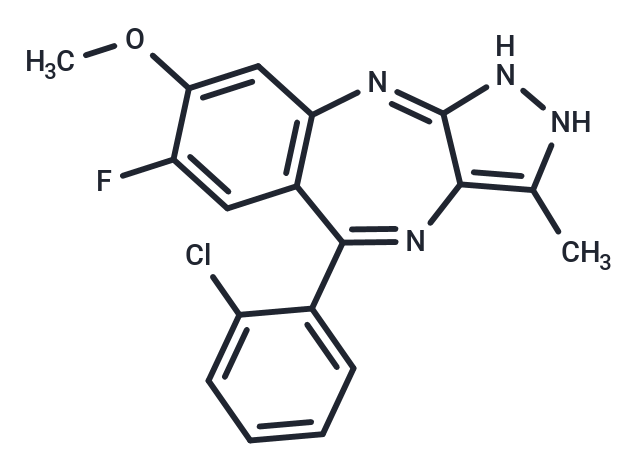Shopping Cart
- Remove All
 Your shopping cart is currently empty
Your shopping cart is currently empty

R1530 is a multikinase inhibitor with antineoplastic and antiangiogenesis activities.

| Pack Size | Price | Availability | Quantity |
|---|---|---|---|
| 1 mg | $48 | In Stock | |
| 2 mg | $68 | In Stock | |
| 5 mg | $113 | In Stock | |
| 10 mg | $172 | In Stock | |
| 25 mg | $347 | In Stock | |
| 50 mg | $592 | In Stock | |
| 100 mg | $852 | In Stock |
| Description | R1530 is a multikinase inhibitor with antineoplastic and antiangiogenesis activities. |
| Targets&IC50 | FGFR1:28 nM, VGFR2:10 nM |
| In vitro | R1530 inhibits multiple receptor tyrosine kinases involved in angiogenesis, such as VEGFR-1/2/3, PDGFR, Flt-3, and FGFR-1/2. In the presence of R1530, polyploid cancer cells underwent apoptosis or became senescent which translated into potent in vitro and in vivo efficacy. Normal proliferating cells were resistant to R1530-induced polyploidy. Mitotic checkpoint kinase BubR1 was found downregulated during R1530-induced exit from mitosis, a likely consequence of PLK4 inhibition [1]. R1530 strongly inhibited human tumor cell proliferation. Growth factor-driven proliferation of endothelial and fibroblast cells was also inhibited [2]. |
| In vivo | Showing significant tumor growth inhibition in a lung cancer xenograft model, R1530 was administered at doses ranging from once daily, weekly and twice weekly (3.125-50 mg/kg qd, 100 mg/kg qw, 100 mg/kg kg biw). Tumor regression occurred in all models treated with the maximum tolerated daily dose (50 mg/kg). Doses of 25 and 50 mg/kg qd resulted in biologically significant increases in survival in all models tested. After oral administration to nude mice, R1530 showed good tissue permeability. Exposure was dose-dependent, up to 100 mg/kg when administered orally[2]. |
| Alias | R-1530, R 1530 |
| Molecular Weight | 356.78 |
| Formula | C18H14ClFN4O |
| Cas No. | 882531-87-5 |
| Smiles | COc1cc2N=C3NNC(C)=C3N=C(c3ccccc3Cl)c2cc1F |
| Relative Density. | 1.46 g/cm3 (Predicted) |
| Storage | Powder: -20°C for 3 years | In solvent: -80°C for 1 year | Shipping with blue ice. | ||||||||||||||||||||
| Solubility Information | DMSO: 5 mg/mL (14.01 mM), Sonication is recommended. | ||||||||||||||||||||
Solution Preparation Table | |||||||||||||||||||||
DMSO
| |||||||||||||||||||||

Copyright © 2015-2025 TargetMol Chemicals Inc. All Rights Reserved.